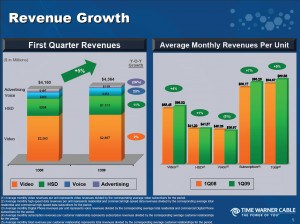Time Warner Cable reports healthy growth for the first quarter of 2009, ending March 31st.
Time Warner Cable Chief Executive Officer Glenn Britt said: “Time Warner Cable performed well in the first quarter, growing revenues, adjusted OIBDA and free cash flow from last year. We added very healthy numbers of new subscribers to our video, high-speed data and phone services, and our commercial services business continued to grow rapidly.”
Britt added: “We’re excited to be an independent company. Cable is a very good business, and our operations are strong and growing despite a challenging economy. We continue to generate very healthy free cash flow which will enable us to reduce debt over the next year.”
High-speed data revenues increased 11% ($107 million) to $1.1 billion, as a result of continued residential high-speed data subscriber growth and increased average revenue per commercial subscriber.
Time Warner Cable’s revenues are up across the board, including in high speed data, where the revenue per subscriber is up another 30 cents to $41.57 per subscriber.
In a morning conference call, Time Warner Cable executives reported they’ve leveraged additional earnings from reduced expenditures on infrastructure and cost cutting. In the first quarter, Time Warner Cable added an additional 225,000 subscribers, making broadband by far Time Warner’s most resilient product line. Penetration continues to increase in all markets for broadband. Across the board, Time Warner Cable has a 33% penetration rate for Internet access, including all providers (dial-up/broadband). In many markets, the rate is over 40%.
Costs and returns for high speed data have stabilized for high speed data products, according to company officials, calling into question claims that Internet growth would create financial and capacity problems for Time Warner Cable. Investors are getting a different message, with not a single word about capacity challenges or issues in the broadband division.
Company officials also admitted Turbo customers are helping “stabilize” revenues achieved from customers downgrading to “Lite” service tiers, allowing those heavier users with Turbo service helping to effectively subsidize revenue returns for lighter consumption “Lite” customers.
Spending on overall residential capital spending is expected to continue to decline, which means although company officials complain of costs associated with broadband expansion, the company does not plan to internally spend dramatically more money to deal with it. DOCSIS 3.0 deployment was announced in just one Time Warner market: New York City, where it is expected to be deployed by the end of 2009. Company officials claim they are not in a hurry to deploy the technology because of insufficient need and demand, which also completely contradicts earlier claims that the company needed to complete DOCSIS to deal with “Internet brownouts.”
“We do not see enormous demand at this time for speed. We will gradually roll out DOCSIS 3.0 on a market by market basis over the next several years,” said company officials.
To meet competitive challenges, the company is significantly discounting product packages where AT&T U-verse and Verizon FiOS competition exists. Company officials admitted that AT&T’s U-verse product is posing a greater challenge for them during the past quarter, perhaps due to its more aggressive rollout in AT&T territories.
In another admission, Time Warner Cable officials admitted that the video side of the business does face a challenge from online video. Time Warner said it is exploring ways to stop losing video subscribers by partnering with cable networks to only make video programming available online to those with a confirmed video cable subscription.
Switched digital video is a primary driver of the expansion of fiber optic deployment, to provide additional HD channels to customers, not to meet broadband Internet demands.
Time Warner Cable does face some pressures on revenue — from the video side of the business. Company officials admit there have been downgrades away from premium channels and digital cable services after recent rate increases and financial pressure from the poor economy. The company has embarked on new marketing strategies with special targeted incentives and lower pricing for certain groups, citing the Latino Spanish speaking community as one particular example. In some areas, the Spanish language marketing materials promote lower pricing and better promotions than those targeted to the English speaking community.
Company officials are also leveraging price protection agreements in their marketing strategies to “stabilize” pricing in return for a commitment to stay with the company for the length of the contract. These agreements reduce downgrades and disconnects, known as subscriber churn in the industry.


 Subscribe
Subscribe

